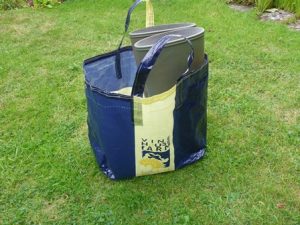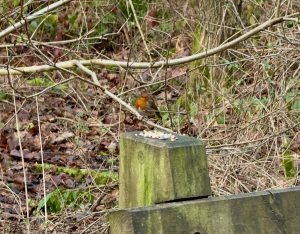Our position on plastic packaging
Updated January 2022
We’ve long encouraged comments from our customers and discussion with them, and indeed our openness and willingness to listen continues to shape our business and how we operate. Perhaps unsurprisingly given the level of media attention, a subject that keeps coming up from our customers is around all-things packaging – though in particular the use of plastic. We’ve previously published our position on plastic packaging and revisited this for updates, so we’re again doing that at the start of 2022 as there have been some developments and notably around recycling.
Summary of what’s covered below:
- As things currently stand, we don’t believe there is any viable alternative to us using polypropylene for food products including seed.
- Polypropylene is recyclable and is classified as ‘PP5’, with this now easily and properly disposed of by consumers through using their local supermarket’s soft plastic recycling facility.
- During 2022 and into 2023, our plastic sacks will start to contain 30% recycled material.
- We’ve been able to progressively switch to a paper-based sack to hold smaller multiple items, with this representing what we see as a sensible balance to incorporate at least some paper into our wider packaging materials mix – albeit we have some reservations about its true value in an environmental sense.
- The drive to net-zero strengthens the argument for continued use of plastic for our main bird food packaging, as it has a much lower carbon footprint compared to paper.
- We very much hope, and indeed expect, other materials will come onto the market in the future which will be more environmentally acceptable, and we will continue to seek advice from relevant experts to inform our decision making
Current necessity for plastic packaging for food products
Certainly for our food products and in particular seed, plastic packaging is currently essential. As the main examples of current use, the sacks we use to send out seeds and seed mixes in are a type of plastic called polypropylene. The key reasons for this choice is a) it has great strength and won’t tear in transit (as could, for example, a coated paper sack), and b) the material is excellent at preventing moisture penetration – which is essential to stop seed and seed mixes from becoming contaminated. In addition, the properties of polypropylene make it ideal for not being effected by oil – which is also essential given the nature of products such as sunflower hearts.
Recycling of polypropylene
Up until the middle of 2021, the ease to which polypropylene – the recycling code for which is PP5 – could be recycled was limited, as only some local authorities and specialist private companies would take it. However, the position has hugely changed for the better, with supermarket chains including Tesco and Coop now taking the material as part of their ‘soft plastic’ recycling schemes. So this means that our plastic sacks and bags can now be deposited at local supermarkets as part of your regular shopping trip.
No current viable alternatives available to plastic sacks for seed
If we only operated from our farm shop, then a possible alternative would be a coated paper sack because the only handling would be into a customer’s car and then the unloading of it when they got home. But of course, the vast majority of the products we supply are delivered by courier to our customers’ homes, and in this respect the packaging has to withstand the rigours of transport, multiple handling and the weather. So on a practical level alone, single large sacks of seed can therefore only currently be safely delivered using a polypropylene sack.
What’s more though, the coating on paper sacks – or ‘multiwall bags’ as they’re often referred to in the trade – mean they’re typically not recyclable anyway. So in this respect, the polypropylene sack is no worse than the paper sack – and some would argue that the polypropylene sack is actually better in an environmental sense because it can be recycled.
A specific question we’re also sometimes asked is why we don’t use a coated paper sack (and putting aside the recycling issue) and then put this in a cardboard box for added protection. There are two reasons for this: Firstly, such an approach more than doubles the amount of packaging – which clearly isn’t a good thing, even though the box could be recycled. Secondly, the cardboard box still wouldn’t be weatherproof or necessarily strong enough to withstand the rigours of transport, given, say, a 25kg sack of feed inside it.
More recycled plastic coming into use
During 2022 and into 2023, the plastic sacks we use will start to contain at least 30% recycled material. We obviously welcome this step, albeit the motivation from a manufacturers’ perspective is partly a financial one, in that a tax is being imposed from April 1st onwards of £200 per metric tonne for plastic which doesn’t contain the 30% recycled material. None the less, it’s clearly a good move for all parties and not least as it adds actual value to the recycling process.
A shift to paper sacks for multiple items
During 2020, we trialled strong paper sacks as an alternative to the woven polypropylene sacks we’ve historically used as a single outer container for multiple items – e.g. smaller bags of seed and feeders etc. The previous issue had always been that we needed the strength of the woven polypropylene sack to withstand the multiple handling from when the transport company picks up from us, through to being unloaded at depots around the country, reloaded onto smaller vehicles, then finally delivered to you, our customers. In the past we hadn’t been able to source a paper-based sack which was strong enough, but on-going advancements in packaging technology has now made this possible. So we continued to roll-out a switch to paper-based sacks for this type of delivery during 2021. For clarity, the strong paper sack doesn’t have to be 100% weather-proof because the packaging of the seed products inside (e.g. a 4kg bag of sunflower hearts) will still be in a polypropylene bag.
Whilst we see some benefit in this move and it’s been well received by many customers, for the reasons we set out elsewhere in this article we do have reservations about its value in true environmental sense.
Plastic versus paper in the context of net-zero
Like all businesses, at Vine House Farm we have to meet the target of net-zero carbon. If green energy is taken into account we probably already achieve this because of our wind turbines on the farm, but for purely our bird food operation we think it is right to measure this separately. Packaging in therefore an important component part, with plastic remaining the better option to paper because its production has a third of the carbon footprint compared to paper. Paper also weighs more than plastic for the equivalent quantity of packaging, so therefore this also has a negative carbon impact in transportation. Given this position, even if there was a suitable paper option for our current bird food packaging needs, then we’d be increasing our carbon footprint by adopting it – and in so doing working against our obligation and desire to achieve net-zero.
Other environmental considerations
A further concern we have about a wider use of paper is that its production for our type of packaging requires around sixteen times more water compared to plastic. Therefore we see this as a negative in the context of climate change. And whilst the majority of paper comes from softwood trees harvested in sustainable plantations, not all of it does with old growth forest still being felled – notably in Sweden and Canada.
What the future holds for packaging
Our expertise is of course in farming, how to do so in an environmentally and wildlife-friendly way, producing high quality bird food, plus the study of birds and in particular with the aim of reversing the decline in farmland and garden bird numbers. We’re certainly not experts in packaging and how the industry will develop new products in the future, so we’re very reliant on working with specialists who are. As a result of this on-going dialogue, we expect to see new products coming onto the market which will include, for example, polymer substitutes manufactured from fermented plant starch such as potatoes or corn. This example raises another relevant issue though, and this around whether it will make economic or environmental sense to switch farmland for such use, rather than for producing cereals and vegetables for food – in particular if the trend for more plant-based diets continues.


